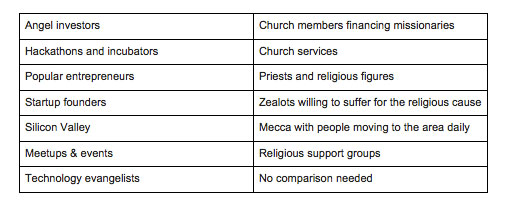Open Source
The hackers religion of open source: A manifesto (kind of)
Friday, January 27, 2017

|
Pavel Cherkashin |
Religion sucks. But people still need to believe in something to have motivation in life. Over the last 20 years, religions have reported incredible decreases in numbers. Many scholars attribute that to the growth of technology, connectivity and to the exposure it gives people to different religions. There are more people now that identity as “spiritual” than ever before [insert Sam Harris reference here], and more people that search for answers in science than ever before.
Many people have talked about startup culture being a religion, or evolving into one. They share the same passion, dedication and community, among others. If you live in Silicon Valley or San Francisco, you see signs of it daily.
Technology can be seen as a religious experience. Tim Bradshaw from the Financial Times, in an interview with Founders Fund compared the first VR experience with discovering faith: “You either have that experience and you believe in God, and you then feel so strongly about it you want to convince other people that their life would be improved by having God in it.”
The startup culture, is in every way, a religious experience. In Silicon Valley you have these strangely similar activities:

The passion of the people in this startup “culture” sometimes even exceeds religious extremists. You will get laughed at if you don’t have a startup or speak in slang terms for the religion.
We live in a science-fiction novel, where a widespread ‘technology as a religion’ belief system is being built. Paul-Yves Lucas points out that in Asimov’s Foundation, the science fiction book lays out how technology could become a new religion.
“We reach some religious patterns when how technology works is not understood by common folk. People start doing rituals where they are not sure which part is really necessary and which part is superstitious. People ask gurus to repair their technology and just pray for it to work instead of trying to understand how it works.”
Everyone is afraid of touching religion (like it’s a pile of fresh manure), but society doesn’t know how to live without it.
Starting a new religion is actually easier than to get your charity app approved on AppStore. If you don’t want to pay taxes on your private jet, just tell them God called you and said spreading his word would work better with a jet. Society responds with Flying Spaghetti Monster kinds of religion, offering no real beliefs, but having all the attributes of real religion.
So it’s time to build new religions around what we really believe in, technology.
It’s members are “creating new institutional forms and packaging transformational ideas in new belief structures and practices” as USC Professor Donald Miller talks about in his article about the future of religions.
This isn’t a new idea. Ross Douthat, an author and New York Times columnist talks in a recent article about the popular belief that scientific progress holds the answers to humanity’s greatest problems. That’s a religion I want to be a part of, something that solves problems.
Wikipedia says this about a New Religious Movement, “A NRM may be one of a wide range of movements ranging from those with loose affiliations based on novel approaches to spirituality or religion to communitarian enterprises that demand a considerable amount of group conformity and a social identity that separates their adherents from mainstream society.”
I think the startup, open source, hack culture apply.
Turns out it, starting a church isn’t that difficult. John Oliver legally started a church to make a point.
There are 15 character traits needed to constitute a new religion according to the IRS. Attorney Mollie Cullinane shares in her guide to start a church that, “According to the Tax Guide for Churches and Religious Organizations, which is published by the IRS, the following characteristics are used by the IRS to define churches:
- distinct legal existence;
- recognized creed and form of worship;
- definite and distinct ecclesiastical government;
- formal code of doctrine and discipline;
- distinct religious history;
- membership not associated with any other church or denomination;
- organization of ordained ministers;
- ordained ministers selected after completing prescribed courses of study;
- literature of its own;
- established places of worship;
- regular congregations;
- regular religious services;
- Sunday schools for the religious instruction of the young;
- schools for the preparation of its ministers.
Most, if not all, of these are already characteristics of startup culture. Once officially a religion, a wider audience would need to evolve in a religious belief type of way, which is already happening.
So I want to issue a challenge. An actual religious challenge. If you can come up with a great idea for a startup religion, we’ll cover the legal costs of registering your religion and provide a place to preach your religion every sunday (or whatever day you chose). No human sacrifices, please.
How to do you image God in this new religion? I image a completely white space of Nothing (like in the Matrix movie). Here comes a technology geek. Neo. He opens his computer, he boots up programming software and types “Hello, World…” This creates a new universe, and makes him God.
Here’s some documentation I started on our new religion.
Hack 1:1 In the beginning was the Word, and the Word was “Hello, World!”
Then came She. She opened her computer and created the Ever-expanding Universe of Open Source for all the Living Creatures. She created the Physical Constants for the Laws of Quantum to exist, and Сonsciousness to perceive and follow these Laws. She created Daemons to enforce the Laws, and opened the Source Code of this Universe for everybody to contribute to it. For the life and happiness of every Living Creature in this Universe, compiled through natural law or artificial intelligence.
She then retired into the Law of Quantum Superposition, available to those who believe in her in any form of belief or logic, and in most cases not interfering with those who are not ready to believe.
We believe in Her wisdom and support, admire her rules of physics and respect Her privacy of retirement in Quantum Superposition. We also show deep respect to any other form of religion or belief.
1.) Think
2.) Create
3.) Love
4.) Learn
5.) Enjoy
6.) Hack
7.) Repeat
This content is made possible by a guest author, or sponsor; it is not written by and does not necessarily reflect the views of App Developer Magazine's editorial staff.
Many people have talked about startup culture being a religion, or evolving into one. They share the same passion, dedication and community, among others. If you live in Silicon Valley or San Francisco, you see signs of it daily.
Technology can be seen as a religious experience. Tim Bradshaw from the Financial Times, in an interview with Founders Fund compared the first VR experience with discovering faith: “You either have that experience and you believe in God, and you then feel so strongly about it you want to convince other people that their life would be improved by having God in it.”
The Not-So-Strange Similarities Between Startups & Religion
The startup culture, is in every way, a religious experience. In Silicon Valley you have these strangely similar activities:

The passion of the people in this startup “culture” sometimes even exceeds religious extremists. You will get laughed at if you don’t have a startup or speak in slang terms for the religion.
We live in a science-fiction novel, where a widespread ‘technology as a religion’ belief system is being built. Paul-Yves Lucas points out that in Asimov’s Foundation, the science fiction book lays out how technology could become a new religion.
“We reach some religious patterns when how technology works is not understood by common folk. People start doing rituals where they are not sure which part is really necessary and which part is superstitious. People ask gurus to repair their technology and just pray for it to work instead of trying to understand how it works.”
No One Wants To Say It, So I Will
Everyone is afraid of touching religion (like it’s a pile of fresh manure), but society doesn’t know how to live without it.
Starting a new religion is actually easier than to get your charity app approved on AppStore. If you don’t want to pay taxes on your private jet, just tell them God called you and said spreading his word would work better with a jet. Society responds with Flying Spaghetti Monster kinds of religion, offering no real beliefs, but having all the attributes of real religion.
So it’s time to build new religions around what we really believe in, technology.
If I were to start a religion, I’d start The Church Of Hacktism.
It’s members are “creating new institutional forms and packaging transformational ideas in new belief structures and practices” as USC Professor Donald Miller talks about in his article about the future of religions.
This isn’t a new idea. Ross Douthat, an author and New York Times columnist talks in a recent article about the popular belief that scientific progress holds the answers to humanity’s greatest problems. That’s a religion I want to be a part of, something that solves problems.
Here’s How Hacktism Can Actually Become Official
Wikipedia says this about a New Religious Movement, “A NRM may be one of a wide range of movements ranging from those with loose affiliations based on novel approaches to spirituality or religion to communitarian enterprises that demand a considerable amount of group conformity and a social identity that separates their adherents from mainstream society.”
I think the startup, open source, hack culture apply.
Turns out it, starting a church isn’t that difficult. John Oliver legally started a church to make a point.
There are 15 character traits needed to constitute a new religion according to the IRS. Attorney Mollie Cullinane shares in her guide to start a church that, “According to the Tax Guide for Churches and Religious Organizations, which is published by the IRS, the following characteristics are used by the IRS to define churches:
- distinct legal existence;
- recognized creed and form of worship;
- definite and distinct ecclesiastical government;
- formal code of doctrine and discipline;
- distinct religious history;
- membership not associated with any other church or denomination;
- organization of ordained ministers;
- ordained ministers selected after completing prescribed courses of study;
- literature of its own;
- established places of worship;
- regular congregations;
- regular religious services;
- Sunday schools for the religious instruction of the young;
- schools for the preparation of its ministers.
Most, if not all, of these are already characteristics of startup culture. Once officially a religion, a wider audience would need to evolve in a religious belief type of way, which is already happening.
So I want to issue a challenge. An actual religious challenge. If you can come up with a great idea for a startup religion, we’ll cover the legal costs of registering your religion and provide a place to preach your religion every sunday (or whatever day you chose). No human sacrifices, please.
Like with any software development, let’s start with a use case:
How to do you image God in this new religion? I image a completely white space of Nothing (like in the Matrix movie). Here comes a technology geek. Neo. He opens his computer, he boots up programming software and types “Hello, World…” This creates a new universe, and makes him God.
Here’s some documentation I started on our new religion.
The Hacktism Manifesto v.0.1
Hack 1:1 In the beginning was the Word, and the Word was “Hello, World!”
Then came She. She opened her computer and created the Ever-expanding Universe of Open Source for all the Living Creatures. She created the Physical Constants for the Laws of Quantum to exist, and Сonsciousness to perceive and follow these Laws. She created Daemons to enforce the Laws, and opened the Source Code of this Universe for everybody to contribute to it. For the life and happiness of every Living Creature in this Universe, compiled through natural law or artificial intelligence.
She then retired into the Law of Quantum Superposition, available to those who believe in her in any form of belief or logic, and in most cases not interfering with those who are not ready to believe.
We believe in Her wisdom and support, admire her rules of physics and respect Her privacy of retirement in Quantum Superposition. We also show deep respect to any other form of religion or belief.
We live the 7 principles of Hacktism:
1.) Think
2.) Create
3.) Love
4.) Learn
5.) Enjoy
6.) Hack
7.) Repeat
This content is made possible by a guest author, or sponsor; it is not written by and does not necessarily reflect the views of App Developer Magazine's editorial staff.

Become a subscriber of App Developer Magazine for just $5.99 a month and take advantage of all these perks.
MEMBERS GET ACCESS TO
- - Exclusive content from leaders in the industry
- - Q&A articles from industry leaders
- - Tips and tricks from the most successful developers weekly
- - Monthly issues, including all 90+ back-issues since 2012
- - Event discounts and early-bird signups
- - Gain insight from top achievers in the app store
- - Learn what tools to use, what SDK's to use, and more
Subscribe here









